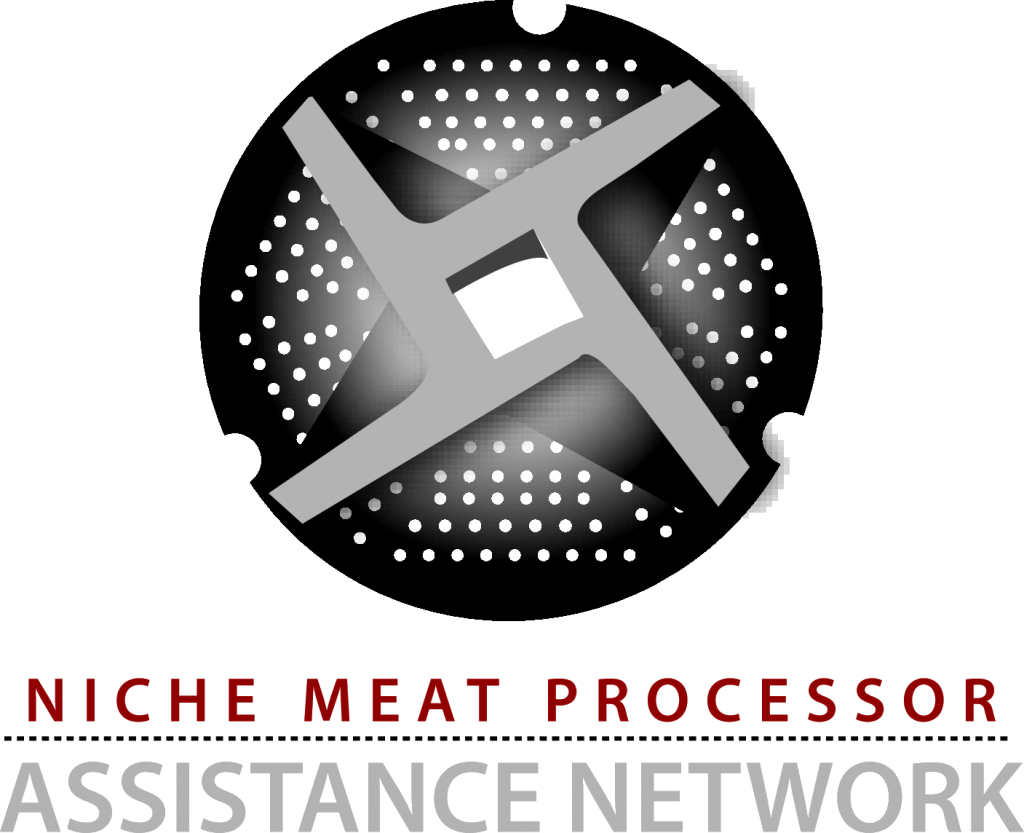Basic Information
Capacity per day: 8-10 head of cattle per day, 300 chickens per day
Species: Cattle and chickens
Services: Processing
Square feet: 4,500 sq. ft.
#/type of employees: 3 full-time, 2-4 part-time
Hours per day of operation: 8 hours per day
Weeks per year of operation: 52 weeks per year
Annual sales revenues: $3 million in annual sales
Price of services: Beef price paid to co-op negotiated every 30 days. Chicken price paid to Amish farmers negotiated every 30 days.
Operational costs: Operational costs of the meat processing plant are not broken out separately in the accounting system of the parent company. Annual payroll for the plant is approximately $300,000.
Retail on-site: No
Wholesale: Yes
State or USDA inspected: USDA inspected plant #21334
Certified organic: No
Name of certification agency: Not applicable
Custom work: No
Source verification on label: Yes
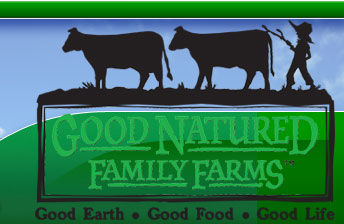
The Market Opportunity
Good Natured Family Farms is a brand that sells into the Kansas City region. The company, Rainbow Organic Farms, needed a processing plant when the plant they had been using burned down. So they bought a small, state-inspected plant, got federal inspection, and now all of their beef and chickens are processed there.
All of the meat processed at the plant is made into products sold by the Good Natured Family Farms brand, so the plant has only one customer, and is well organized to meet the requirements of sales and marketing. All of the beef processed at the plant comes from the farmer co-op, and the co-op sells exclusively to the plant, so the plant’s supply and demand are kept in balance through the close alignment of the three entities: the plant, the co-op, and the distribution company.
Throughout this case-study we will refer to the plant, company, and brand as “Good Natured Family Farms.”
Basic History/Development
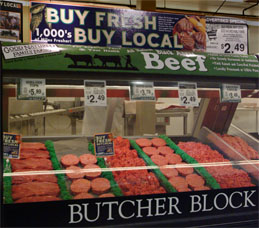
Good Natured Family Farms is a model of responsible vertical integration: the parent company of a working farm, a meat processing plant, and a food distribution company, the steward of the Good Natured Family Farms brand, and the organizer of the farmer-owned All Natural Beef Co-op. The farm, the co-op, and the food distribution company existed for years before the meat processing plant was purchased, giving the plant some unique advantages.
Diana and Gary Endicott, owners of the company, purchased the 4,500-square-foot meat processing plant in September 2000, when the plant they had been using burned down and they needed to find a new location to process the co-op’s meat. Since Good Natured Family Farms was already marketing and distributing beef, and took over an existing plant that was in operation, they had much of what they needed to get started, including equipment, staff, expertise, product, trucks, and markets. The Uniontown plant operates as a business unit of Good Natured Family Farms, and is not a separate corporation. The Uniontown plant evolved over many years and previous owners from doing custom work to a retail butcher shop. One staff person that came with the plant was a previous owner of the facility when it was under state inspection. He stayed on for the first year and worked as a butcher.
The People/Organization(s) Involved
Diana and Gary Endicott are the owners of the Good Natured Family Farms brand, the parent company, and leaders in the All Natural Beef Co-op.
The co-op worked with Good Natured Family Farms from the beginning to get the Uniontown plant up and running and move product to market. The co-op has 18 members, a board of directors, and a president who manages day-to-day operations. (For more about the parent company, see The Wallace Center’s GNFF case study.)
Funding Source
The Endicotts financed the purchase and improvement of the plant with their own money, a bank mortgage, and a loan from the Kansas Department of Commerce. They made improvements to the building, purchased some new equipment, and added coolers for dry aging. It took them about 5 years to pay off all their equipment loans and begin making a profit.
Business Plan
Because Good Natured Family Farms was already marketing and distributing beef in volume, when they took over the plant they already had adequate business to keep the plant busy. With year round business from a supermarket chain, the volume is fairly steady throughout the year. b) They have a memorandum of understanding with the supermarket chain to agree to purchase a set number of beef for the coming year. This also helps the supermarket ensure they have a consistent supply.
The driving factor for consistency on the production side is that Good Natured Family Farms pays above market price. The producers are the market setters and then the customers have to determine their willingness to pay the reflected retail price. Co-op members get paid when their product is sold to the retail grocers. The price may be based on live weight or hanging weight, depending on the season and other factors. Diana works with the co-op board to set the price for beef every 30 days based on market trends, and their own supply and demand. It takes 30 days to implement a change in price because of the logistics of aging, negotiating prices with buyers, and giving them time to implement the new price in their stores.
The co-op insulates members from market fluctuations, because the plant’s price is guaranteed based on their consistent relationship and a smooth flow of supply and demand. Instead of farmers paying by the pound to get their meat processed, and then having to find a market for their product, the co-op farmers sell their beef to the processor/packer each week and get a consistent price.
Deciphering Regulations and Complying
Gary Endicott, who manages the plant’s day-to-day operations, learned to process beef by doing it with other people and watching other plants. Good Natured Family Farms operates the plant as a USDA inspected facility.
Gary developed the plant’s HACCP plan by taking templates off the Internet and customizing them, and working with a group of USDA inspectors to design the system. The Endicotts purchased the Uniontown plant just as the USDA was launching HACCP. Processors, inspectors, and regulators were feeling their way through a new approach to food safety.
Gary had little experience with food safety inspection prior to implementation of HACCP so he does not have a basis for comparing HACCP with the previous approach. He appreciates HACCP because he has some control over the food safety processes in his plant, and he can improve those processes to minimize both risk and record keeping.
The USDA has an ongoing sampling program. Gary may have to provide a sample every day that is sent away to a lab. The inspector may take hamburger, swab the carcass, take antibiotic residue tests, insecticide residue tests, and strip cuts. They may take a sample every day for 80 working days. He says this type of sampling has been going on since he got into business.
Plant Design
One of the challenges for the Uniontown plant is its location on the village square, surrounded by homes and other businesses. In a facility designed without a system of multiple holding pens and chutes to segregate animals, all animals are loaded off the trailer into one pen connected with one chute that leads to the kill floor. This works because the plant doesn’t process more than ten beef a day, so animals are delivered to the plant in small numbers.
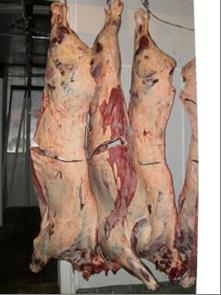
All the beef processed at the plant is dry-aged 12 to 14 days before it is cut and packaged. The plant has a 500-square-foot dry aging room that can hold 120 hanging sides, or two weeks of product. Computers monitor temperatures in coolers and the aging room. The Uniontown plant is one of a very few USDA inspected plants that handle both red meat and poultry. Once a week the cattle kill floor is converted into a chicken processing room. There is a separate room for killing, scalding, and plucking chickens. The Endicotts find that processing more than one species in the plant maximizes both the facility and the marketing and distribution systems.
Big Glitches and How They Were Solved
One of Gary Endicott’s biggest challenges is keeping qualified, competent, committed employees who want to process beef or run a meat plant as a career.
While Gary believes he has optimized his plant’s operations to have the absolute minimum number of critical control points, he experiences the tension of having an inspector with absolute authority on the premises each day. Each inspector has his own interpretation of risk, regulatory compliance, and adequacy of record keeping. Interpretations are subjective and may change daily. Gary has observed the USDA inspector at the plant being micromanaged by his superiors, and says, “Even if you have the same guy at your plant every day, he is being told what to do.” If the interpretation of the information on the paperwork changes, most likely Gary has to do something differently in operating the plant. That means changing processes, paperwork, and procedures, and re-training employees.
Currently, the USDA inspector at the Uniontown plant has been requiring an ante-mortem inspection for each individual beef animal. In the past, the inspector would look over the animals as a group when they arrived and were penned, making a visual inspection of animal health. But things have changed. Now Gary has to write down the number of animals in the trailer and present it to the inspector. The inspector has to look at each animal individually from both sides, moving and standing still, and write down the evaluation. If an animal is suspect, Gary has to segregate the animal and wait until the veterinarian comes to see of the animal is well enough to be slaughtered. If it is not well enough, Gary has to file paperwork before he can return the animal to its owner. The process of inspecting each animal individually, instead of in a group adds 10 minutes to the processing time for each beef.
Required Equipment
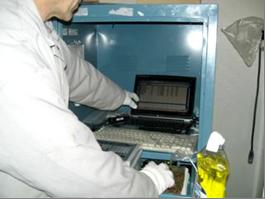
Large coolers for carcass hanging are necessary for 12-14 days of dry aging. Computers are used to estimate per-carcass profitability data for the farmer and also to monitor temperatures in the cooler and aging room.
Staff Needed and How They Were Found/Trained, What They Cost
There are currently three full-time and two to four part-time workers. The plant’s annual payroll is approximately $300,000.
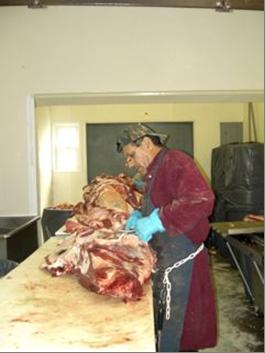
Pay ranges from $6.00/hour for entry no experience to $16.00/hour for meat cutter/slaughter. Benefits include 4 paid holidays per year, one week paid vacation per year, and two weeks vacation per year after 5 years. They originally paid 100% health insurance, but when costs increased cost they began paying 50% with employees picking up the other 50%. However, since most of the employees are young males they opted not to participate. Therefore, they now do not offer health insurance.
The all-natural beef co-op worked with Good Natured Family Farms from the beginning to get the Uniontown plant up and running and move product to market. The co-op has 18 members, a board of directors, and a president who manages day-to-day operations. The president is an experienced cattle farmer who organizes each week’s delivery of 30 cows to the plant with an eye toward providing a consistent number of pounds of meat from week to week. Every farmer in the co-op receives the same price per pound regardless of variance in quality from animal to animal.
Financial Sustainability Plan
The business is self-sustaining and hasn’t needed outside funding since initial development.
Markets Accessed
Good Natured Family Farms primarily sells to two supermarket chains in the Kansas City Region: Hen House Markets and Balls Price Chopper.
Meat Delivery
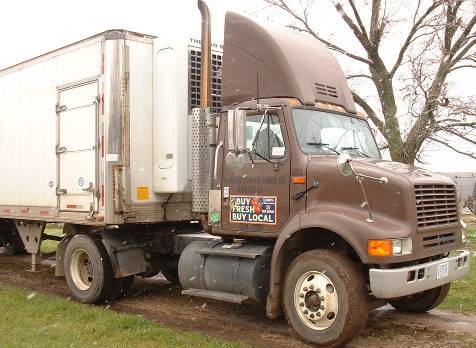
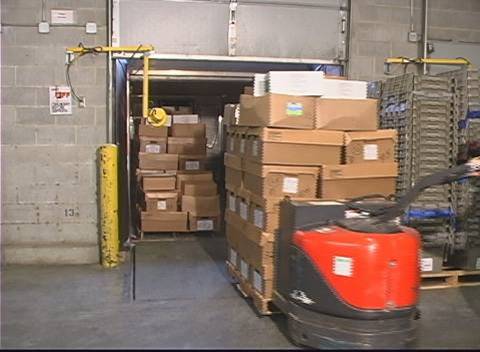
Images of Good Natured Family Farms delivery truck and unloading a pallet of meat at the supermarket dock.

